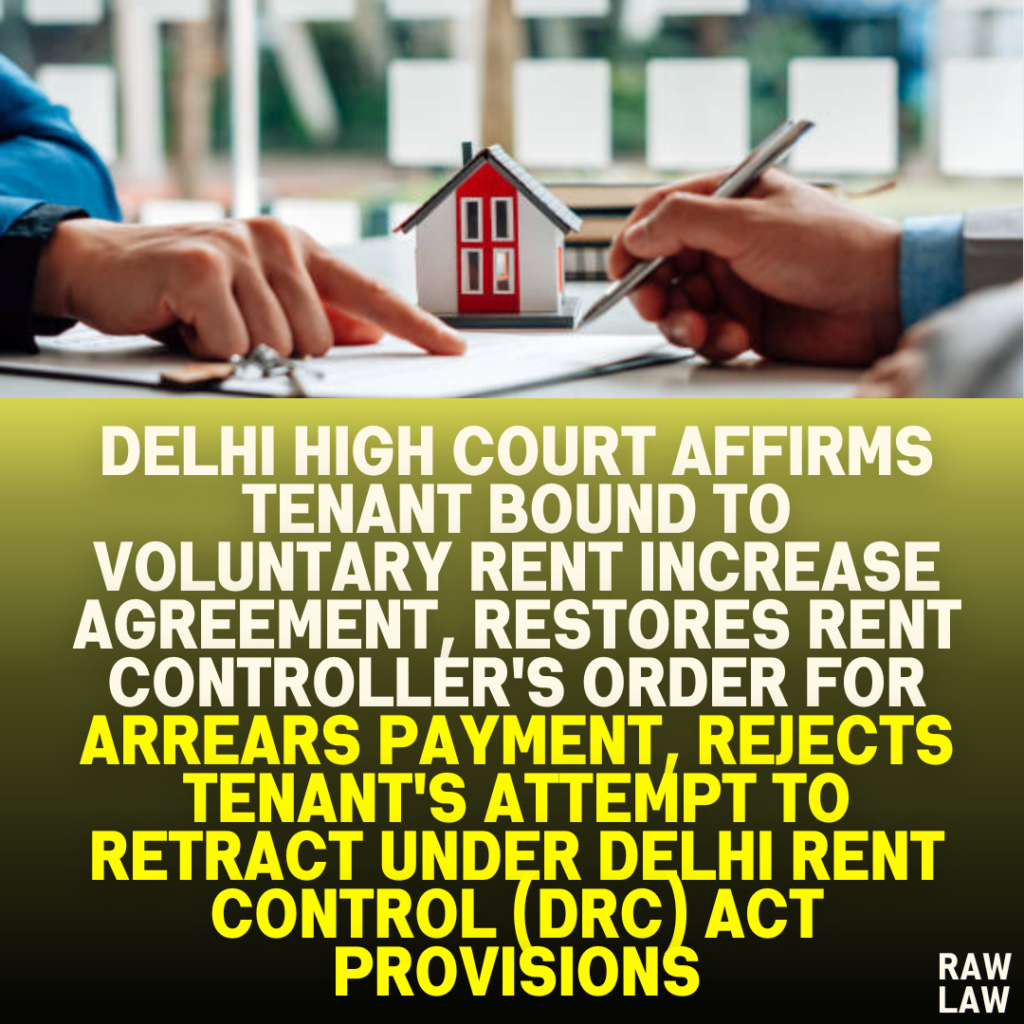Court’s Decision
The Delhi High Court set aside the Rent Control Tribunal’s order, restoring the Rent Controller’s original directive that required the tenant to pay the enhanced rent as per an affidavit-cum-undertaking signed in 2000. The court held that the tenant, having voluntarily agreed to annual rent increases, was bound by this agreement and could not later invalidate it by citing statutory provisions under the Delhi Rent Control Act (DRC Act).
Facts
The case involves a long-standing tenancy where the tenant operated a clinic in a rented shop. In 2000, the tenant signed an affidavit agreeing to an annual 10% rent increase, starting from a base rate of ₹1,000 per month. By 2009, the rent had increased to ₹2,357. Despite the tenant’s subsequent claims of coercion, he continued to pay the enhanced rent for nearly a decade. The landlord initiated eviction proceedings under Section 14(1)(a) of the DRC Act due to non-payment of the increased rent as stipulated in the agreement.
Issues
- Can a tenant retract from a voluntarily agreed-upon rent increase, claiming it violates statutory limitations under the DRC Act?
- Does Section 6A of the DRC Act, which allows rent increases only every three years by 10%, supersede a bilateral agreement between the landlord and tenant for an annual increase?
Petitioner’s Arguments
The landlord argued that the tenant had voluntarily agreed to an annual 10% increase and consistently adhered to this rate until 2009. Thus, the arrears were legally recoverable under the terms of the affidavit signed in 2000.
Respondent’s Arguments
The tenant claimed that the annual rent increase agreement violated Sections 6A and 8 of the DRC Act, which only permit a 10% increase every three years. The tenant also alleged that the affidavit was signed under coercion, rendering it invalid.
Analysis of the Law
The court examined Sections 6A and 8 of the DRC Act. Section 6A allows rent increases at a fixed rate every three years but does not explicitly prohibit higher increases agreed upon bilaterally by both parties. The court found that the DRC Act’s protective provisions are primarily designed to prevent unilateral rent increases by landlords, not mutually agreed terms.
Precedent Analysis
The court referenced Hindustan Plywood Co. v. Naresh Kumar Chadha, affirming that statutory limitations on rent increase apply to unilateral demands but allow mutual agreements for higher rates. Additionally, Consep India Pvt. Ltd. v. Cepco Industries Pvt. Ltd. clarified that Section 6A does not prohibit parties from agreeing to higher rent increases within a lease agreement.
Court’s Reasoning
The court concluded that the tenant could not claim statutory protection after voluntarily adhering to the agreed rent increase for nearly a decade. Given the bilateral nature of the agreement, the court found no evidence of coercion or statutory violation.
Conclusion
The High Court set aside the Tribunal’s order, reinstating the Rent Controller’s directive requiring the tenant to pay the arrears per the 2000 agreement. The tenant was instructed to deposit the due rent within one month and to continue making future payments as per the agreement.
Implications
This ruling underscores that while the DRC Act is protective, it does not override mutually agreed-upon terms. It affirms tenants’ responsibility to adhere to voluntarily entered agreements, provided they do not contravene the Act’s spirit against unilateral demands.




Pingback: Bombay High Court Directs State CET Cell to Permit Institutional Level Admissions for Vacant NEET-UG-2024 Seats in Medical Colleges, Citing Conflict with NMC Circular and Preventing “Undue Waste of Resources” - Raw Law